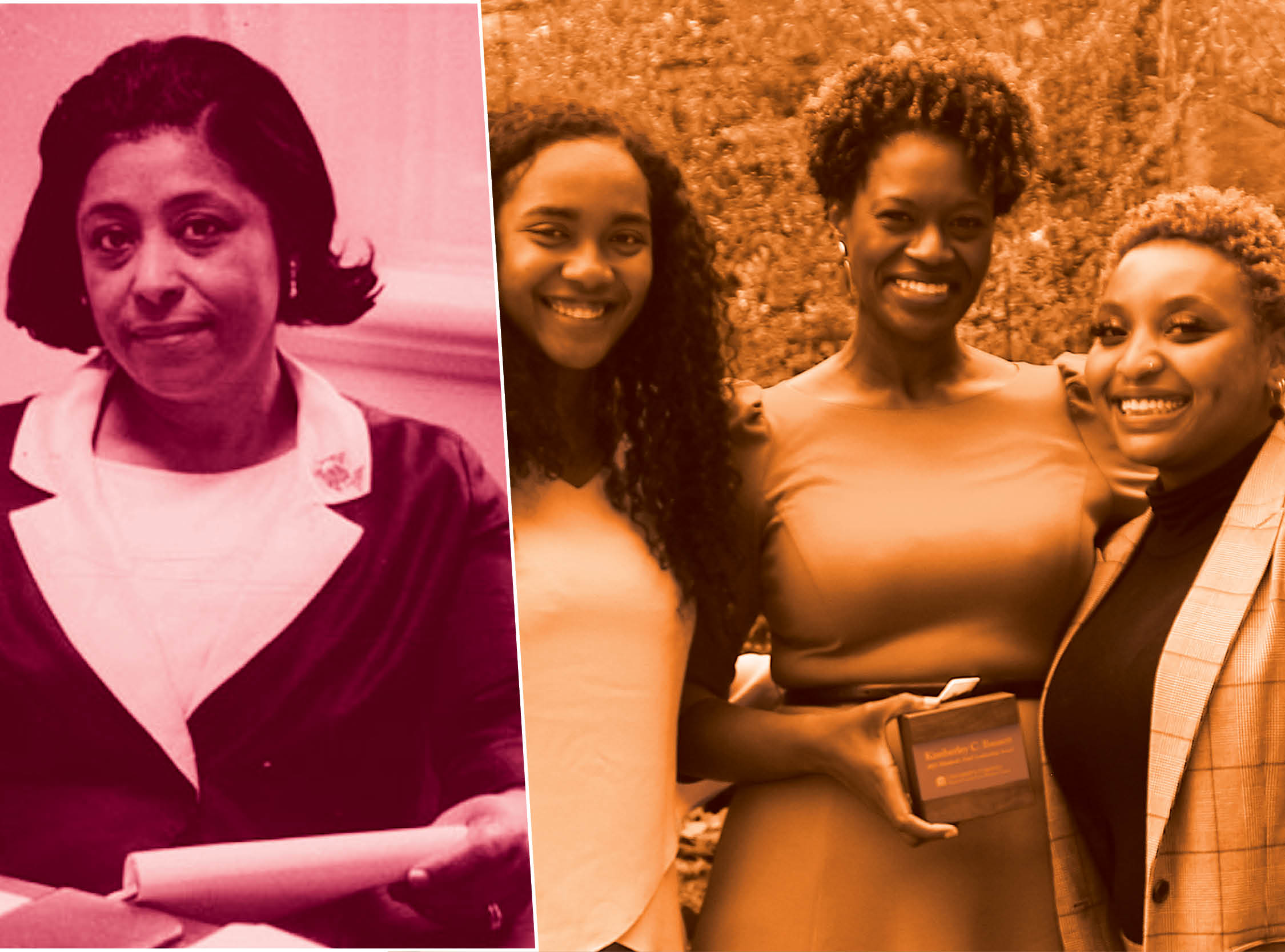
At a recent pop-up that we hosted to engage students with our (re)present exhibit, one of the students who stopped by our table told me, “You're lying!” Her incredulity was in response to my assertation that there were women studying at UVA before 1970. This was definitely not the story that she had heard.
How we tell our history matters. When we say that there were no women students here before 1970 or that no African Americans learned here before 1950, it matters that we are telling an incomplete version of our past.
Let me be crystal clear: the accomplishments that we do recognize were significant achievements that changed the University, making it more inclusive. I do not mean to suggest otherwise.
But when we say the firsts didn't happen until the 1950s or 1970s when they actually happened in the 1920s and even 1860s, we erase the hard fought for and hard-won accomplishments of tens of thousands of people -- and strengthen rather than revise and expand an exclusionary understanding of who belongs at this University.
The Women’s Center is the proud steward of the Elizabeth Zintl Leadership Award, which belies notions that only men have contributed to the growth and development of UVA through its annual acknowledgement of a woman whose contributions to UVA make a direct and significant impact on the core academic enterprise of the University through an unusually high degree of service to the University. We honored Dr. Kimberley Bassett, the 2021 Zintl winner, with a small Covid-appropriate gathering at the end of October. To properly place Dr. Bassett within the context of the legacy of excellence to which she has contributed, I traced a brief (but powerful) timeline, touching on a few milestones in the long journey to fully integrated coeducation here at UVA. This timeline highlights the spirit and legacy that these women – both individually and collectively – have built.
- 1850: Though few of the 5,000 enslaved laborers who built and worked at UVA are known today by name, one whose name was recorded is Isabella Gibbons. From approximately 1850-1863, Mrs. Gibbons was held in slavery, first by the Rogers family and then by the Smith family, working as the primary cook in Pavilion VI; during these years, Mrs. Gibbons learned to read, and then taught her own children. In 1867, Isabella Gibbons was awarded her diploma from the New England Freedmen’s Aid Society’s Charlottesville Normal School, and she became a teacher in Charlottesville. While she was never granted a degree from UVA, nor was she even legally permitted to follow any (formal) course of study, this is the earliest example of women learning — and teaching — at UVA.
- 1913: According to Jackson Davis, the state agent for African-American rural schools for the Virginia Department of Education, in 1913 Caroline Preston Davis assisted an unnamed, local African American teacher in securing employment as a housekeeper at UVA. This enabled the teacher to listen to the summer school sessions that segregation laws prevented her from formally attending.
- 1935: Two decades later, Alice Jackson Stuart, an African American graduate of Virginia Union University, applied to UVA under the 1920 provisions that admitted women to the graduate and professional schools. When the BOV denied her application on the grounds of segregation, this rejection drew national attention and the NAACP considered filing a discrimination lawsuit. Under the resulting media attention and pressure, the Virginia General Assembly passed the Dovell Act, which awarded qualified African-American applicants state scholarships to pay tuition at out-of-state graduate schools. Jackson used this funding to earn her Masters degree at Columbia University. She taught at the collegiate level for the rest of her career, dedicated to advancing equal educational opportunities for African Americans.
- 1935 (appx): In the decades before full co-education, the Co-Ed Room on the West Range served as a “home” on the grounds, for women students. Bettie Slaughter reigned over the Co-Ed Room during the 33 years she served as its housekeeper and cook, fostering the space’s friendly, welcoming environment. The playful nickname “Bettie Co-Ed,” bestowed by the “girls” who saw her as a friend, confidante, and surrogate mother during their UVA years, ignores the painful reality that Betty herself could not attend UVA as an African American woman.
- 1950: Fifteen years after Ms. Stuart’s application was rejected, in January 1950, E. Louise Stokes Hunter enrolled in the School of Education in pursuit of her graduate degree. Dr. Hunter, a colleague and classmate of Walter Ridley, was the first African American woman to be granted a degree from UVA: she earned her doctorate in education in August 1953. She was a faculty member at Virginia State University, where she taught mathematics, and a founding member and 8th president of the Delta Omega Chapter of Alpha Kappa Alpha Sorority.
- 1969: When Dr. Elizabeth Jones Johnson was hired as Assistant Dean of Admissions in 1969, she was the University’s first full-time Black admissions officer. At the time, Black students comprised fewer than 1% of the total undergraduate population. Johnson prioritized their recruitment and retention, and by 1971, applications from black high school students had increased by 25 percent. She earned her doctorate in Education from UVA in 1971, and she went on to take a faculty position at St. Paul’s College.
- 1972: Sandra Lewis had been one of twelve African American students who integrated Venable Elementary School here in Charlottesville on September 8, 1959. Just a little more than a decade later, she would be one of the first Black women to graduate from UVA, earning her bachelor’s degree from the College of Arts and Sciences in 1972.
- 1980: For 29 years, beginning in 1980, Sylvia Terry dedicated herself to building up the confidence of minority students at UVA, first in the Office of Admissions, where she coordinated minority recruitment, and then in OAAA as Associate Dean. At OAAA, she created the groundbreaking and renowned peer advisor program, to ease the transition from recruitment to retention. Her steadfast efforts created a warm, welcoming environment on Grounds, leaving a legacy of strengthened retention of Black students.
- 1987: Deborah McDowell joined the English faculty in Fall 1987, where her dazzling array of literary criticism “laid the cornerstone for a sound, thorough articulation of the Black feminist aesthetic.” At the same time, she has mentored cohort after cohort of emerging scholars, each of whom has gone on to add their own contributions to fields ranging from Africana Studies to anthology to history to literature to political science. At a time when African American Studies programs across the country fear closure, she shepherded the Carter G. Woodson Institute to departmental status and nurtured the intellectual home that produced an expansive array of scholarship.
- 2007: The 2021 Zintl honoree, Dr. Kimberley Bassett, continues this legacy of excellence. After earning her PhD in Chemistry at UVA in 2007, Kimberley Bassett began her tenure at UVA in OAAA in 2007. As Associate Dean in OAAA, she has prioritized collaborating with colleagues in units across Grounds and developing structures to strengthen student support, building out the academic and co-curricular advising to help today’s students chart their own pathways for success. The challenges that students of color face at UVA have intensified in recent years as the University, Charlottesville, and the nation grapple with the legacy of slavery and racism. Kimberley has continued the development and growth of the Peer Advisor Program to meet the cultural needs of today’s students. Under her stewardship of the Peer Advisor Program, with the augmented academic support she introduced, students achieved further leaps of success.
This story reflects generations of women – specifically black women – at UVA building on the accomplishments of the women who came before them. This is not the history we most loudly proclaim – but it is the history with the greatest potential to transform UVA into a fully inclusive community and to fulfill our greatest aspirations.

